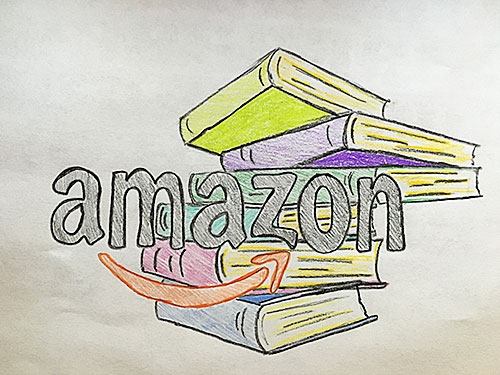Picture this: You sit down with your morning coffee and routinely check your social media site of choice—in this case Twitter. Lo and behold, the trending topic of that dreary November morning is none other than (surprise!) Amazon’s new brick-and-mortar bookstore in Seattle, Washington. Your heart sinks, and suddenly that morning coffee doesn’t quite taste the same. For that solitary moment, all your hopes and dreams as an aspiring publishing professional disappear. Not only does Amazon rule the online marketplace for books, but now it is on the path to taking over the cherished place of brick-and-mortar bookstores.
Believe it or not, this is a true story. The 5,500-square-foot location at the University Village in Seattle opened in November 2015. Aptly named “Amazon Books,” the former Borders retail space functions similarly to other brick-and-mortar stores, but with its own unique spin. All books are placed face out, in an attempt to give every title equal opportunity. However, this creates less room for inventory to be placed on the shelves. Below each book is a card with a review or rating from Amazon.com. It is like “staff picks,” but uses customer reviews instead. The store uses statistics based on customer ratings to choose its inventory, and it also uses collected data to modify that inventory to appeal to Seattle-based customers. Books are priced the same as the online store.
So what is it that makes our toes cringe at the thought of Amazon making its way into the beloved (independent or not) brick-and-mortar stores? For me, it feels like corporate greediness. I will be the first to admit, although not proudly, that I have purchased books through Amazon. After spending my first term learning the basics of the book publishing industry, I have been enlightened on the effect Amazon has in the book marketplace, and I now make every effort possible to support local independent brick-and-mortar stores. On the one hand, Amazon’s efforts to broaden their selling opportunities are also creating room for readers to purchase more books. On the other hand, they are taking away from the mom-and-pop stores that don’t have the same level of resources or funding. And ultimately Amazon is further affecting the book supply chain. Their brick-and-mortar store has the same principles as their online store: undercutting pricing. This takes a toll not only on the brick-and-mortar store hosting the same book, but also the royalties the author receives and the cut that the publisher gets from the purchase. I’m not saying you must stop making purchases from Amazon right this minute. That would be absurd. I’m only advocating educating yourself as a reader, considering all the options, and making informed decisions.
The Seattle Times indicated that the company hopes to open more stores in other cities. What does this mean for independent bookstores that readers and publishing professionals love so much? The future is unpredictable, especially in the publishing industry. We can only hope that the book purchasing options we have now will still be there in the years to come.

